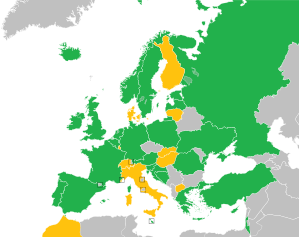2003 Eurovision Song Contest
| Eurovision Song Contest 2003 | |
|---|---|
| Magical Rendez-vous | |
 |
|
| Dates | |
| Final | 24 May 2003 |
| Host | |
| Venue | Skonto Hall, Riga, Latvia |
| Presenter(s) | |
| Directed by | Sven Stojanovic |
| Executive supervisor | Sarah Yuen |
| Executive producer | Brigita Rozenbrika |
| Host broadcaster | Latvijas Televīzija (LTV) |
| Interval act | Iļģi, Brainstorm, Marie N and Raimonds Pauls |
| Participants | |
| Number of entries | 26 |
| Debuting countries |
|
| Returning countries | |
| Withdrawing countries | |
| Vote | |
| Voting system | Each country awards 1–8, 10, and 12 points to their ten favourite songs |
| Nul points |
|
| Winning song | |
| Eurovision Song Contest: Riga 2003 | ||||
|---|---|---|---|---|
 |
||||
| Compilation album by Eurovision Song Contest | ||||
| Released | 19 May 2003 | |||
| Genre | Pop | |||
| Length | 76:47 | |||
| Label | CMC | |||
| Eurovision Song Contest chronology | ||||
|
||||
The Eurovision Song Contest 2003 was the 48th annual Eurovision Song Contest. The contest took place in Riga, Latvia on 24 May 2003, following Marie N's win in the 2002 contest with the song "I Wanna". It was the first win and hosting of the competition for Latvia with only their third participation after debuting at the 2000 contest. Latvijas Televīzija (LTV) chose the Skonto Hall as the venue after conducting a bidding process among several cities and venues in Latvia. The hosts for the contest were the previous year's winner Marie N and former Latvian representative at the 2000 contest, Renārs Kaupers, who competed in the contest as part of the band Brainstorm. The design of the contest was built around the theme "Magical rendez-vous", which represented the meeting of the various European nations coming to Latvia and encountering Latvia's versatile landscapes. Twenty-six countries participated, which saw the return of Iceland, Ireland, Netherlands, Norway and Poland after having been relegated from competing the previous year, Portugal returning to the contest after withdrawing the previous year, while Ukraine participated in the contest for the first time.Denmark, Finland, Lithuania, Macedonia and Switzerland were required to withdraw due to their poor results in the 2002 contest.
...
Wikipedia


